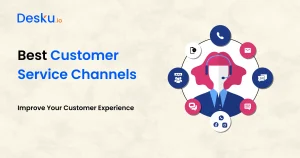You may wonder if enterprise search is simply a dressed-up version of a basic search bar – but it’s not. It’s an essential gear in the machine of contemporary business procedures. With its ability to swiftly locate and provide pertinent data throughout a company, it’s reshaping how businesses operate.
But what does enterprise search really mean? What benefits does it bring to your business? And how can you make the most of it considering the 2024 tech environment? We’ll tackle these questions, and more, revealing how this impactful tool can supercharge your organization’s efficiency and decision-making power. Keep reading to journey through this yet-to-be-fully-explored area.
Key Takeaways
- Enterprise Search Essentials
- Not just an advanced search; it’s key to modern business efficiency.
- Core Benefits
- Boosts productivity and decision-making by providing quick access to relevant data.
- Optimization Strategies for 2024
- Keep updated with tech trends, personalize for users, and ensure seamless integration with other tools.
- Future Outlook
- Evolving with AI advancements, enterprise search is set to become more pivotal for businesses.
What is Enterprise Search and How Does it Help?

In the data-fueled world we live in, understanding enterprise search is a must. Think of it as a smart system that neatly arranges and indexes data from multiple sources within your organization. This makes it easy for users to sift through a mountain of information and find exactly what they need.
So, what does an enterprise search engine do? Well, it’s like a handy tool that sifts through your databases, intranets, directories, and other data sources to find and present the relevant information you’re looking for. It’s not just about finding any random piece of information; it’s about finding that exact piece of data you need from a pile of similar data.
Imagine it as a powerful torch that lights up the hidden corners of your data storage, bringing the necessary information to the forefront. But, it’s no walk in the park. The data you’re dealing with is varied, and stored in different formats and locations. The enterprise search engine has to understand these formats, know where to look, and present the results in a way that makes sense.
That’s the magic of enterprise search – it helps you navigate the sea of data with ease. And when you can find the information you need quickly, you can make better decisions, faster. It’s like having a personal assistant who knows exactly where everything is, saving you time and effort. So, if you’re dealing with lots of data, enterprise search could be your secret weapon.
Read More : 8 Essential Features of Enterprise Help Desk Software for Superior Customer Support
Benefits of Enterprise Search
So, you’re curious about how enterprise search can help your organization, right?
It’s not just about quickly locating information. It’s much more than that.
Enterprise search drives productivity, helps in making informed decisions, and allows effortless access to archived data.
Let’s have a friendly chat about these benefits so you can appreciate the real worth of enterprise search.
1 Time-Saving
Imagine if you could carve out an extra 8 hours per week for your employees. Sounds impossible, right? Well, with the help of enterprise search, it’s entirely achievable. This smart tool swiftly brings up the necessary information, pushing up productivity levels.
Let’s delve into the many ways that enterprise search helps to save time:
- Finding info in a snap: With enterprise search, the time used to find data drops by an amazing 50%. So, decisions can be made quicker, making your business nimble and quick to respond.
- A boost in overall efficiency: When enterprise search is brought into the picture, the time spent on searching for data reduces by 40%. This leaves your employees free to focus on more important tasks.
- Upgraded employee productivity: As a result of the time saved, we see a 30% rise in productivity. This makes your organization even more competitive.
- Better customer satisfaction: Your clients also enjoy the benefits of quick access to relevant info, leading to a 25% increase in satisfaction.
2. Boosts Employee Productivity
Think about how much time your team spends simply looking for the information they need to do their jobs. It’s a lot, right? Now, imagine if they could find what they need almost instantly. Sounds great, doesn’t it? That’s exactly what enterprise search can do for your organization. It’s like a super-fast, super-smart search engine just for your business. It gives your team quick access to crucial data, reducing the time spent looking for information.
Imagine how much more your team could do if they didn’t have to waste time wading through irrelevant information. With an efficient search tool, like enterprise search software, they can focus on what they’re really good at, their core tasks. This can lead to better overall performance and happier employees. Plus, when your team can work more efficiently, they can make a bigger contribution to achieving your organization’s goals.
3. Informed Decisions
The current business world is all about data. It’s like a secret sauce that makes everything better. And one key ingredient to making that sauce perfect? Enterprise search. Here’s how it can give your team a leg up:
- It’s like having a personal data detective. Your team can sift through data quickly and efficiently, pulling out strategic insights that can boost your decision-making process.
- It’s like a time machine for your data. Your team can pull up historical data, trends, and insights that can help guide the business towards growth.
- It’s like having a live data feed. Your team can pull up real-time data and analytics, which can boost your company’s flexibility and quick response time.
- It’s like having a data librarian. Your team can retrieve data in a streamlined way, ensuring all the necessary info is right there when you need it.
With an enterprise search, you’re not just swimming through a sea of data. You’re turning it into a gold mine of useful insights. This can lead to better decision-making and ultimately, help your organization succeed.
4. Smoother Archive Access
Ever thought about how easy it would be if all the old information stored in your organization could be found in just a few clicks? With enterprise search, that’s not just a dream anymore. Enterprise search is a tool that enables you to quickly find and access archived data within your organization.
Ever piled up a bunch of papers and then struggled to find that one important document from a few years ago? Just like sorting those papers, enterprise search works by systematically indexing all the data from different sources in your organization. And the best part? It includes archived data too. This means that all your historical information is just a search away, ready to pop up in a snap.
Imagine the time saved from not having to rummage through old files and folders. That’s the beauty of enterprise search – it makes the whole process efficient and user-friendly. It cuts down on the time spent searching for information, making your team more productive.
And it’s not just about getting your hands on the information quickly. It’s also about getting the right information. With enterprise search, you can find accurate historical information that can help you make better decisions. And it’s not just beneficial for your team. Even your customers can benefit from it as they can quickly find the information they need.
5. Improved Decision-Making
Imagine being able to find the right information for your organization, right when you need it.
That’s the magic of enterprise search! It’s like having a super-efficient assistant who can:
- Whip up the data you need in a jiffy, making the decision process quicker by cutting out the long and tedious hunt for data.
- Provide a thorough understanding of the data, so you’re always making decisions based on solid evidence.
- Keep you updated with the freshest data, so you always make decisions based on the latest and most accurate information.
- Make sure you’re working with top-quality information, by making data retrieval a breeze.
With enterprise search, your organization is in a better position to make sharp, informed decisions at all levels. It’s like having a secret weapon that gives you fast access to relevant and fresh information, while also making sense of all the data. And the best part? It supercharges your decision-making process, paving the way for your organization’s success. It’s time to experience the power of enterprise search!
6. Fewer Data Silos
With an enterprise search, tearing down data silos is as easy as pie. It pulls together data from numerous sources like databases, your intranet, and directories, creating a single platform to access and search information. This unified approach wipes out the need to jump through hoops navigating multiple isolated systems, making it a piece of cake for departments to collaborate and share knowledge.
By reducing the number of data silos, you make it much easier to access data across your entire organization, which can really boost efficiency and help make better decisions. Enterprise search accomplishes this through effective indexing, bringing together all kinds of data into one, easy-to-understand structure. When you pair this with top-of-the-line search features, you get fast, accurate access to the information you need.
7. High Quality Data
Enterprise search can do wonders for your data quality, and that’s great news for your search results. It’s all about keeping your data clean, organized, and user-friendly.
- Clean Data: Consider enterprise search a big broom, sweeping away old, duplicate records that clutter up your databases. It’s like spring cleaning for your data, and the result is a much tidier, more efficient system.
- Data Management: Enterprise search also plays the role of the strict librarian, making sure all your data is properly filed and up to current industry standards. It’s all about good governance to keep your data reliable.
- Organized Search: Having quality data has another perk – it supports an organized search. It’s like having different sections in a library, making it much simpler for users to find what they’re looking for.
- Better Recommendations: And here’s the cherry on top – when your data is clean and high-quality, it can help AI make more accurate recommendations. It’s like having your own personal assistant, providing valuable insights based on your high-quality data.
Key Features of Enterprise Search
- User-Friendly Interface: Simplifies data finding, eliminating complexity.
- Indexing/Archiving: Organizes data systematically, like a precise filing system.
- Defined User Permissions: Secures access, ensuring sensitive data is protected.
- Natural Language Processing: Enhances search intuitiveness to understand human language queries.
- Relevance Ranking: Improves search by prioritizing the most pertinent results.
These features collectively enhance search efficiency, leading to improved productivity and decision-making.
1. An interface through which to search for and retrieve data
Think about how useful it would be to have a one-stop shop for all your data needs in your organization. We’re talking about an enterprise search interface – not just any search tool, but a complete data search powerhouse. It makes getting data from multiple sources as easy as pie.
Here’s the lowdown:
- You pop a question into the interface.
- It scours all the connected data sources like a pro.
- You can fine-tune the results using filters like data type, date range, or anything else that suits your needs.
- It neatly sorts the results into categories, making it easy for you to pick and choose.
Far from being just a tool, it’s a game-changer that can make your work life more efficient, boost your knowledge management, and ramp up productivity. To cut a long story short, it’s a must-have for your data management game plan.
2. Indexing and Archiving of data
Let’s have a chat about the key elements of enterprise search, specifically, the indexing and archiving of data. These two components are the backbone of a smooth and precise data retrieval operation.
So what’s indexing? It’s a way of arranging your data from all kinds of sources, making sure it’s ready for fast recovery. It’s like putting labels on your data, so you know exactly what, where, and how to find it. This boosts the relevance and speed of your search results, ensuring no time is wasted in your quest for information.
Then, we’ve archiving, which is all about keeping your old data within reach. It’s an essential part of the process that allows you to go back in time and access past records and information. It gives you a complete picture of your data history.
3. Defined User Permissions for Accessing Information
Managing access to information is a key element of any enterprise search strategy. It’s all about making sure that the right people have the right access. This isn’t only vital for the security of your data, but also to make sure that everyone can do their job effectively and efficiently.
You see, when it comes to access control, it’s not a one-size-fits-all situation. Different people in your organization have different roles and responsibilities, and their access to information should reflect that. By setting up user permissions, you can ensure that each person can only access the data they need to do their job.
But it’s not just about efficiency – it’s also about compliance. Many organizations have strict data governance policies, and making sure that you have clear user permissions in place is a big part of adhering to those policies.
One way to manage this is by setting up granular access controls. This way, you can control access to each document or data source individually, adding an extra level of security.
And let’s not forget about the risk of data breaches. By carefully managing who has access to what, you can greatly reduce the chances of your data falling into the wrong hands.
4. Natural Language Processing (NLP)
Imagine this – you’ve got a powerful tool at your disposal that can give your enterprise search system a serious upgrade. We’re talking about natural language processing, or as the cool kids call it, NLP. What’s the deal with it, you ask? Well, it’s like a secret decoder ring for human language. It can understand and interpret what we’re saying, making your search experience smoother and more accurate.
NLP is like a detective, it takes a good hard look at user queries and figures out the meaning, the context, and the intention behind them. This means you don’t just get search results, you get search results that really hit the mark. But it’s not just about finding information – it’s about understanding what that information actually means to your search.
Think of NLP as a mind reader. It gets you. It understands your queries on a semantic level, delivering results that aren’t just accurate, but also relevant to your context.
And it gets better. NLP doesn’t just give you search results, it personalizes them. It learns your preferences and behaviors and tailors the search experience to fit you perfectly. It’s like having a personal assistant who knows exactly what you want.
When you bring NLP into your enterprise search, you’re not just speeding up information retrieval. You’re boosting productivity, and transforming the way users experience your system. And who doesn’t want that?
5. Relevance Ranking
Getting your head around relevance ranking can change how you find information in your business. Let’s break it down:
- Keywords Matter: First off, relevance ranking looks at keyword matches. If the match is spot-on, it gets a higher spot on the list.
- What Are You Up To?: We use machine learning to get a sense of what users are looking for, which helps us rank results better.
- It’s All About the Context: Where and when a search is made can shift the relevance ranking. For example, newer documents might be seen as more relevant.
- The Little Details Count: Bits of information like the title, author, or date can also change the ranking.
With better relevance ranking, you’ll notice things run smoother, folks are happier, and your enterprise search tool works like a charm.
6. Content Enrichment
Content enrichment is like the secret sauce that makes searching for information in the business world so much better. It’s not just about slapping on some extra tags or keywords. It’s more like giving your search results a mega upgrade.
So, how does it work? Well, it pulls in extra details, sorts the content into neat categories, and adds a pinch of context to the mix. The result? Your search queries hit the bullseye more often, pulling up results that are just what you were looking for.
Think of features like identifying key subjects, analyzing the tone of the text, and summarizing the content. These all play a part in making sure you find what you need with no time wasted. Plus, it opens up the door to tailored suggestions and speedy access to info, which makes searching for stuff a total breeze.
7. User-Friendliness
Content enrichment certainly does its part in refining search experiences by delivering accurate and context-aware results. Yet, it’s the user-friendliness of enterprise search systems that really takes things to the next level.
- Smooth and simple interfaces: It’s all about ease of use. The design and navigation of these search systems are made with the user in mind, helping you locate what you need without any bumps in the road.
- Quick-fill suggestions: This handy tool speeds up your search time by guessing what you’re typing in real time.
- Tailored to you: The ability to save searches and modify filters lets you shape the system to your particular needs. Your search experience becomes all about you.
- Works well on all devices: No matter what gadget you’re using, the adaptable design of the system ensures a smooth ride.
8. Flexibility and Customization
Flexibility and customization are significant aspects when it comes to enterprise search tools. They allow organizations to tailor search functions to meet specific needs, adapting to changing requirements over time. Personalized features like faceted navigation and AI-guided suggestions can enhance user engagement.
Mobile-friendly interfaces are another crucial consideration, ensuring that the tool remains user-friendly even on the go. Flexibility plays a key role in advancing search capabilities to meet evolving user needs.
The ability to customize search interfaces, fine-tune algorithms, and tailor results to user preferences can maximize the utility of data. The customization and flexibility offered by these tools empower organizations to optimize the search experience according to their unique requirements. Leveraging this adaptability is essential for making the most of an enterprise search tool.
9. Search Analytics
Let’s chat about search analytics, an essential element of enterprise search tools. It’s like a window into user behaviour, search trends, and how well your content is performing. Here’s the lowdown:
- Keeping an Eye on Search Queries: This lets you see what users are looking for, giving you a glimpse into what they need.
- Studying Click-Through Rates: This is a way of seeing how often users choose a result after they’ve made a search.
- Spotting Popular Search Terms: This is a way to find out what’s hot right now and line up your content to match.
- Evaluating User Engagement Metrics: This one helps you see how users are using your platform.
With these insights, you can make decisions based on actual data, find out where you’re lacking content, fine-tune your search functions, and really amp up the performance of your enterprise search tool.
Why is Enterprise Search Strategic in Big Companies?
Think about it like this: for big businesses, enterprise search is more than just a handy tool. It’s a game plan, a strategy. It’s like having a magical key that can open up huge treasure chests filled with information.
It boosts productivity by cutting down the time we waste trying to find the right information and makes our decision-making process smarter. From the simple act of searching to the more complex cognitive search, and all the different ways it can be used, let’s chat about why enterprise search holds such an important role in the strategy of big businesses.
1. Content without access is worthless
Think about the big world of major corporations out there. Enterprise search is starting to pop up as a handy tool, acting as a flashlight in the dark, helping you find the critical content you need when you need it. It changes the game in how data is used throughout a company. So you see, if you can’t get to your content, it’s as good as useless.
Let’s break it down:
- Chowing down on data: Enterprise search systems gobble up data from all sorts of places, making it a breeze to get to and use.
- Getting your hands on data: These systems are like librarians, organizing and indexing the data so you can get your hands on the information you need swiftly and easily.
- Finding the needle in the haystack: Enterprise search is like your own personal detective, helping you find and use data quickly, so you’re not wasting time searching for a needle in a haystack.
- Smoothing out the process: When you can get to your data instantly, everything runs smoother, decisions get made quicker, and productivity goes through the roof.
2. Time Is Money: How Enterprise Search Increases Productivity?
Let’s chat about how enterprise search can be a real game-changer for productivity, particularly in big businesses where every second has a dollar value attached. Think about it, enterprise search is like a productivity turbo charge. Why? Because it cuts down the time you’re stuck looking for information, making your work processes much smoother.
Here’s a little fact for you: research tells us that employees can spend nearly a third of their working day just hunting down data. That’s a lot of time, right? Now, if you bring enterprise search into the mix, you’re looking at potentially huge time savings. This means your team can shift their attention to tasks that really matter and strategic projects.
But, there’s more to enterprise search than just digging up data. It’s also about making information retrieval a breeze, fostering better team collaboration, and, you guessed it, ramping up productivity. So, when you think about it, time really is money, and enterprise search could be the secret weapon to saving both.
3. Enterprise Search, Insight Engine or Cognitive Search
So, you want to know why big companies are really into things like enterprise search, insight engine, or cognitive search? It all boils down to how these tech tools can boost productivity, help make better decisions, and make it easier to find data.
Let’s break it down:
- Finding Data: Think of enterprise search solutions as a super-efficient librarian. They can quickly track down data from many different sources, saving everyone time and energy.
- Making Decisions: These tech tools are like super-fast researchers. They can quickly find the info you need and that means you can make smarter decisions, faster. And that’s good for business.
- Being Productive: The less time you spend hunting for data, the more time you have to do other things. So, these technologies can help you get more done in less time.
- Innovating: Cognitive search has some serious brainpower. It’s like having a detective on your team, uncovering patterns and insights that could spark new ideas.
4. Apply Enterprise Search to many Use Cases
You know, when we start using enterprise search in a big company, you’ll see how it can be beneficial in a bunch of different situations. It’s like a golden key that opens up access to all kinds of important info across many databases – making things run smoother and faster. It’s like having a superpower that lets you locate data in record time, which is a huge help for customer service. Quicker responses mean happier customers, right?
But that’s not all. Consider how it could be used in research and development. Sharing knowledge becomes a breeze and it can speed up the creation of new ideas. And when it comes to those pesky compliance tasks, enterprise search makes everything easier, helping to keep data safe and in line with industry rules.
This quick and efficient way to find information is also a game changer for the decision-makers in a company. They can use this tool to make better, data-driven decisions. So, as you can see, enterprise search plays a big part in many aspects of a large company’s operations.
Conclusion
Incorporating an efficient enterprise search solution can significantly boost an organization’s productivity, collaboration, and decision-making capabilities. Desku’s Enterprise AI Search solution empowers organizations to swiftly find and access pertinent information across various data sources. When selecting an enterprise search platform, it’s crucial to assess factors such as scalability, customization, user-friendliness, and vendor support. Additionally, considerations like data security, integration with existing systems, and the solution’s ability to scale and adapt to the organization’s evolving needs are paramount.
The advent of AI-powered enterprise search tools offers a unified search experience, enriched with actionable insights and advanced analytics, marking a pivotal step towards optimizing an organization’s information retrieval processes. Embracing these solutions equips organizations to enhance efficiency, foster innovation, and drive success by fully leveraging their enterprise search capabilities. To experience the transformative impact of AI on enterprise search, consider exploring a custom AI demo with Aisera.










